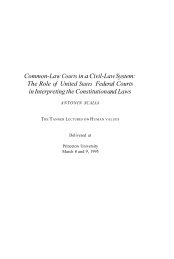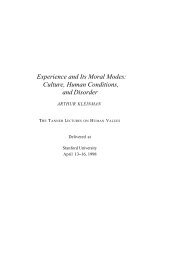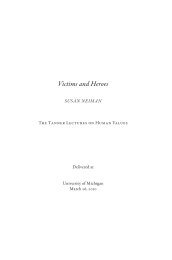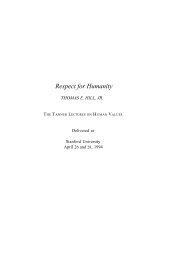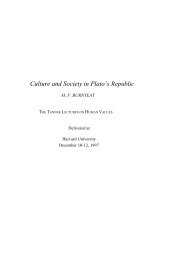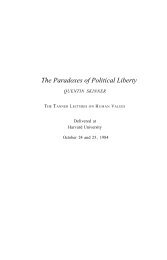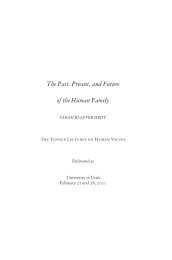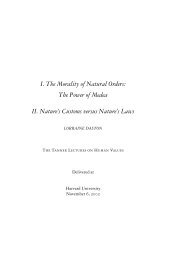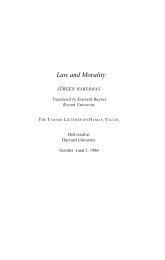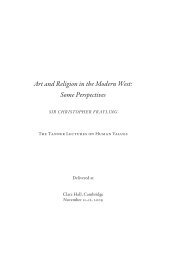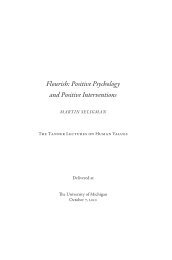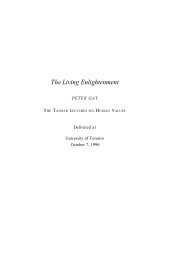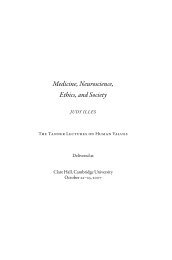Muguerza, Javier - The Tanner Lectures on Human Values
Muguerza, Javier - The Tanner Lectures on Human Values
Muguerza, Javier - The Tanner Lectures on Human Values
You also want an ePaper? Increase the reach of your titles
YUMPU automatically turns print PDFs into web optimized ePapers that Google loves.
[MUGUERZA] <str<strong>on</strong>g>The</str<strong>on</strong>g> Alternative of Dissent 77admirably focuses <strong>on</strong> the heart of the matter and which is prefacedby the author with some twenty-odd pages dedicated to guaranteeingits plausibility. 3 Thus, although it amounts to a stipulati<strong>on</strong>,his proposal is by no means a “Humpty-Dumpty definiti<strong>on</strong>,” sinceit rests both <strong>on</strong> a lexicographical study of the linguistic limits ofthe defined term and <strong>on</strong> something even more important, that is,a c<strong>on</strong>ceptual circumscripti<strong>on</strong> of its c<strong>on</strong>text.In additi<strong>on</strong>, Pérez Luño is well aware of the merits of hisdefiniti<strong>on</strong>, which he believes avoids some of the more qualifiedcharges against the very attempt to define human rights. 4In thefirst place his definiti<strong>on</strong> is not “tautological,” as a definiti<strong>on</strong> wouldbe that read: “the rights of man are those that bel<strong>on</strong>g to him byvirtue of his being a man,” since his definiti<strong>on</strong> not <strong>on</strong>ly specifiesa series of human “requirements” but also menti<strong>on</strong>s the historicalcharacter of this “specificity.” Sec<strong>on</strong>d, neither is it a “formalist”definiti<strong>on</strong>, for example, “the rights of man are those that bel<strong>on</strong>gor ought to bel<strong>on</strong>g to all men, and of which no man may bedeprived,” since Pérez Luño’s definiti<strong>on</strong>, in referring to the activerecogniti<strong>on</strong> of such rights in the legal statutes, leaves enoughmargin for both the normative aspects of the “process of positivesupport in laws,” or legal recogniti<strong>on</strong>, and the techniques of protecti<strong>on</strong>and guarantees as to their actual implementati<strong>on</strong>. Thirdand last, the definiti<strong>on</strong> means to avoid being “teleological,” aswould be the case with definiti<strong>on</strong>s that allude to preserving ultimatevalues, <strong>on</strong>es ordinarily susceptible to diverse and c<strong>on</strong>testedinterpretati<strong>on</strong>s, of the kind: “the rights of man are those necessaryfor the perfecting of human beings, for social progress or thedevelopment of civilizati<strong>on</strong>, and so <strong>on</strong>.” However, in my view itis by no means clear that Pérez Luño’s definiti<strong>on</strong> manages to avoidthis third charge, if that is what it is, with as much ease or as3 Ibid., chap. 1.4 On p. 25 the author draws <strong>on</strong> Norberto Bobbio‘s “L‘illusi<strong>on</strong> du f<strong>on</strong>dementabsolu,” in the joint volume, Les f<strong>on</strong>dement des droits de l’homme (Florence, 1966),3-9; see also 49ff.



